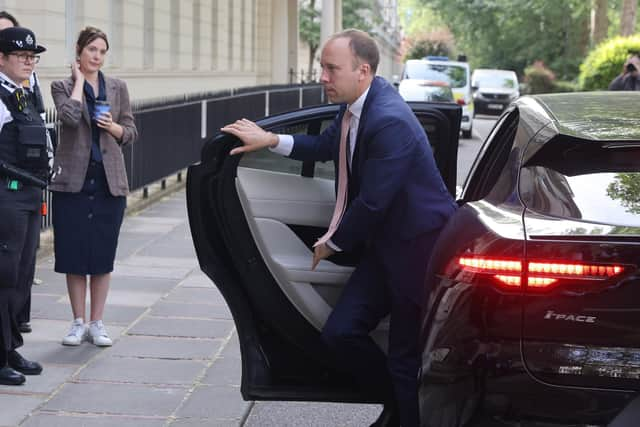UK's covid approach was "completely wrong" former Health Secretary Matt Hancock says
After saying he was “profoundly sorry” for each death, he appeared to launch into a blistering attack on the actions of the Government during his own time in office, saying: The social care system was not fit for purpose; pandemic preparedness was paused so the Government could prepare for a no-deal Brexit; and that planning had focussed on how many body bags would be needed, rather than how to stop or delay it in the first place; among several of other dramatic revelations.
Of the high-profile former politicians to have given evidence to the Covid inquiry so far, he is the one with the most direct involvement in the handling of the pandemic, serving as health secretary from 2018 until he resigned in disgrace after footage of him having an affair and breaking Covid restrictions was leaked.
Advertisement
Hide AdAdvertisement
Hide AdAs he entered the inquiry in central London yesterday, he was confronted by several bereaved family members, including one dressed as the Grim Reaper.


Once inside, he was put under questioning from Hugo Keith KC, lead counsel to the inquiry, for three hours.
Stage one of the inquiry - which is collecting evidence now, is looking at how the UK was prepared before the pandemic, with separate phases due to look at how decisions were made during Covid-19.
Mr Hancock repeatedly said the UK had been too focused on dealing with the outcomes of a pandemic – such as the numbers who would die and whether there were enough “body bags”.
Advertisement
Hide AdAdvertisement
Hide AdHe added: “The problem with the UK plan was that once we got to community transmission, it was wrongly assumed it wasn’t possible to stop the spread.”
He said there are “costs of lockdown” and “you’ve got to work out whether the impact of the virus is going to be worse than the cost of lockdown, and if it is going to be worse, as was the case with Covid-19, you’ve got to hit it hard and very, very early.”
Mr Hancock further blamed international organisations such as the World Health Organisation (WHO) for giving advice which “stated that we should not have lockdowns”.
He said: “In fact in a 2017 document, it said the evidence is not strong enough to warrant advocating legislated restrictions. I thought at the time it was simply an oversight not to consider lockdowns. Actually, it was an explicit decision”.
Advertisement
Hide AdAdvertisement
Hide AdHe told the inquiry the “central failing” that hampered the UK’s response, common with the rest of the western world, “was the refusal and the explicit decision that it would not be possible to halt the spread of a new pandemic – that is wrong and that is at the centre of the failure of preparation.”
The inquiry, chaired by Baroness Heather Hallett, also heard that medicines for intensive care were “within hours” of running out at the peak of the pandemic, Mr Hancock said. He added that the only reason they did not run out was because of work done in 2019 in preparation for a no-deal Brexit.
Questioned about overall pandemic planning, the MP blamed “doctrine” for believing the UK had things under control.
He said doctrinal failures had “consequences” in areas such as “stockpiles, testing, antivirals, contact tracing, and much more widely” when the pandemic struck in 2020.
Advertisement
Hide AdAdvertisement
Hide Ad“For instance, large-scale testing did not exist and large-scale contact tracing did not exist because it was assumed that as soon as there was community transmission, it wouldn’t be possible to stop the spread, and therefore, what’s the point in contact tracing?
“That was completely wrong.”
Comment Guidelines
National World encourages reader discussion on our stories. User feedback, insights and back-and-forth exchanges add a rich layer of context to reporting. Please review our Community Guidelines before commenting.
